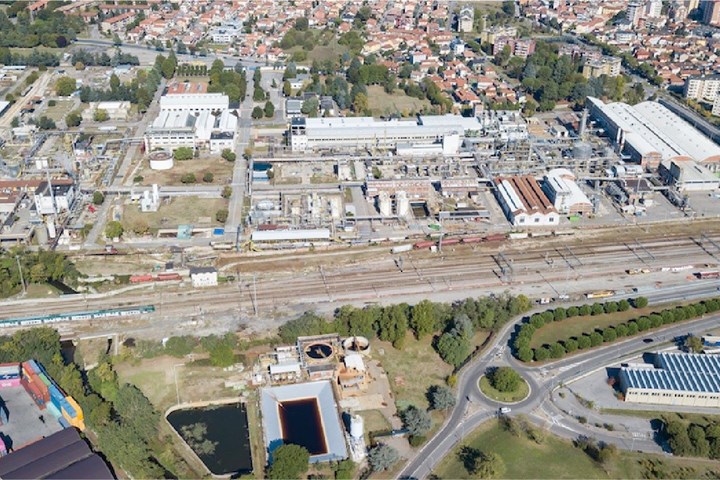Demonstration Facility Will Chemically Depolymerize PMMA for Recycling
Trinseo has scheduled the commissioning of chemical recycling operations at its Rho, Italy, facility for the first quarter of 2024.
Trinseo is developing a demonstration facility at its location in Rho, Italy, which will use chemical recycling to depolymerize polymethyl methacrylate (PMMA). The demonstration plant is scheduled to be commissioned in the first quarter of 2024. PMMA will be transformed by a recycling and purification process that will ready it to be fed back into the plastics value chain.
According to the company, depolymerization complements mechanical recycling technology by expanding the variety of PMMA that can be recycled. The depolymerization operation will be designed for recycling PMMA as well as other difficult-to-recycle structures, which will ultimately be used to produce acrylic resins, sheets and compounds containing recycled materials.

Trinseo manufacturing operations in Rho, Italy. Photo Credit: Trinseo.
“Innovation in recycling technologies is imperative to effectively recycle various types of materials. This new facility is yet another major achievement toward a scalable system with the goal of making PMMA a truly circular material of high quality,” says Francesca Reverberi, chief sustainability officer at Trinseo. “When combined with our own in-house sourcing and treatment of collected materials through our Heathland recycling operation, our PMMA depolymerization plant will offer a high-performance solution for a world increasingly looking for new ways to address sustainability in the plastics supply chain.”
Trinseo’s depolymerization facility is being developed around a continuous recovery model to produce high-quality recycled PMMA that matches the quality of its virgin counterpart, promoting a circular plastics value chain without compromising performance. According to an environmental benefits calculator developed by the MMAtwo project, introduction of recycled monomer into the supply chain will help lower carbon emissions and water consumption.
Material produced using the depolymerization process will be integrated as part of Trinseo's distinctive “R-Life” portfolio designed around a commitment to sustainability, covering both mechanically and chemically recycled PMMA grades. These products find applications across mobility, construction and consumer goods, aligning with the growing demand for products that are developed with sustainability in mind.
Related Content
-
General Polymers Thermoplastics to Further Expand Distribution Business
NPE2024: Following the company’s recent partnership buyout, new North American geographic territories are in its sight.
-
Dow, Circusil Collaborating on Silicone Recycling Facility
Dow and Circusil announced plans to construct a silicone recycling facility in Kentucky.
-
‘Monomaterial’ Trend in Packaging and Beyond Will Only Thrive
In terms of sustainability measures, monomaterial structures are already making good headway and will evolve even further.














